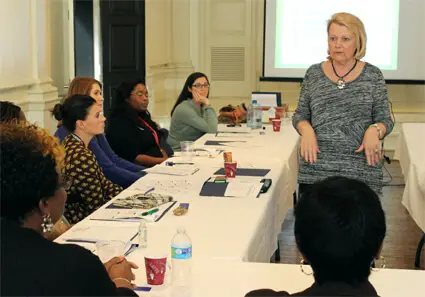Most of the women and families who come to the YWCA Central Alabama are hoping to change their lives. The key is in finding ways to make them want to take the steps necessary to do it.
Members of the YWCA’s domestic violence and housing staffs recently participated in “Motivational Interviewing for Advocates,” a training that focused on strategies for changing behaviors. “We want them to make a change, but when we tell them how to do it, the walls go up,” said Joan Leary, a licensed professional counselor who led the workshop. “This is just a different approach to keep the defenses down.”
The idea is to avoid the “Expert Trap,” said Leary, a project manager with UAB’s substance abuse programs. “We do this with our kids. We tell them what to do, and then they’re thinking of all the reasons why they shouldn’t have to do it.” Instead, she said, the focus should be on helping clients reach their own conclusions and voice the argument for change themselves.
“It’s a very client-centered approach,” said Rebecca Wadley, victims services liaison. “It’s not telling them what to do as much as allowing them to have control and power over what they choose to do about their situation. That’s especially important in domestic violence situations when victims have been controlled. It’s a good way to help them begin to take back that ability to make a choice.”
Parrish Knorr, assistant director of housing, said she has already started using the strategies and has found them helpful. “It’s been beneficial to incorporate this into meetings, sessions, or really any situation where you have the opportunity to positively impact those we serve,” she said. “You have to be mindful not to trigger negative responses because you can break the trust you are working to gain and build on. In the long run, this strategy benefits the relationship between the client and the provider. That’s when you can start to really make a difference.”
If you or your organization would like to donate to or get involved with the YWCA, please click here.
- Empower Women
- Eliminate Racism & Promote Justice
Eliminate Racism & Promote Justice
- Support Families
- End Domestic Violence
- Quick Escape

